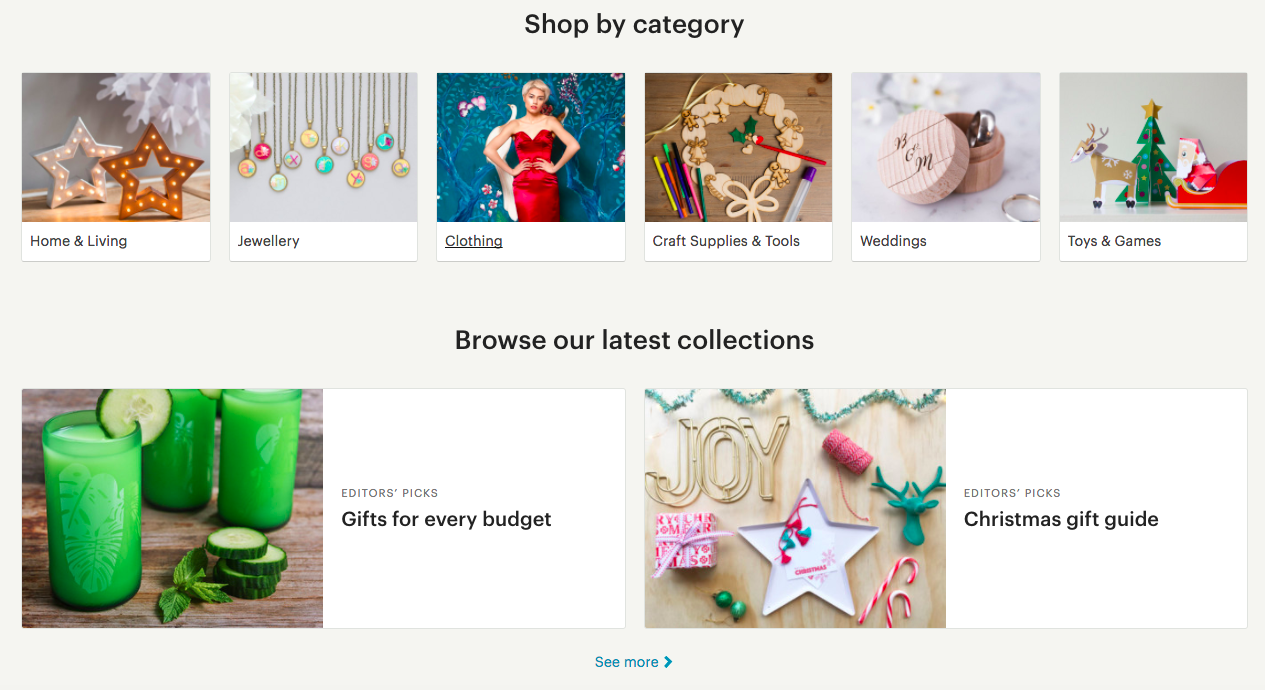How independent retailers can use online outlets such as eBay, Etsy or Shopify to grow their business

Small businesses have a hard time keeping up with the convenience of Omni-channel retailers. Consumers are increasingly purchasing online, making it hard for small boutique owners to keep up with the online world.
However, online e-commerce outlets such as eBay, Etsy and Shopify have enabled small retailers the opportunity to present their wares to a global market. Although these e-commerce sites seem to solve a lot of problems for independent retailers, we thought we’d look at the pros and cons of each so you can decide for yourself whether Etsy and other platforms like eBay and Shopify will work for you.
Etsy
Etsy allows small independent craft makers and artisans to sell their products in a way that they could not have before. Craftentrepreneurs have the ability now to break away from local bric-à-brac markets and reach a wider consumer base.
Firstly, as a customer, it is overwhelming, it is as if you are in the largest craft market in the world, and essentially, you are. Navigating the site is difficult as due to the limited filters, there are pages and pages of stuff you aren’t really looking for. This is both bad for the independent retailers and the consumer. The consumer gets bored of looking, and the independent retailer isn’t given the opportunity to showcase their products.
Another problem for the independent retailer is the lack of brand identity because Etsy doesn’t provide themes for the individuals own page.
However, the benefit of listing your products on Etsy is that it instantly gives trust between you and the consumer, as they already trust Etsy. Furthermore, Etsy provides a community for its retailers, allowing for fellow retailers to share tips and advice in regards to design, process, fabric and so on. They have quoted on their website that “Etsy is not just a shopping and selling venue. It’s a place where members can discover new products, share tips on running their shops, and form human connections.”
In terms of cost to the retailer, Etsy is the cheapest option as it is free to set up with no ongoing monthly fees. The charge to list an item is 20c with a 3.5% transaction fee.
eBay
The great thing about eBay is everyone knows about it. Originally, the site was for people selling second hands goods, but more and more small businesses are using eBay to sell their products. The first pro about using eBay is that it gives you access to millions of potential customers, on a huge global scale.
Another positive is the ease of use, it’s simple, familiar and really takes the pressure off the seller. However, eBay favours their buyers a lot more, leaving sellers with bad reviews for something that may not have been their fault. A couple of bad reviews can literally destroy a seller’s business. Another issue with eBay is the bidding process, sellers may not even get paid for a product as “joy bidders” bet on products without following through to sale.
eBay is certainly the most expensive option with three package levels. Basic, Featured and Anchor. Each has a monthly fee, listing price and transaction fee. There are also some additional features such as adding a ‘Buy it Now’ button which attracts additional fees.
| Basic | Featured | Anchor | |
| Monthly fees | $19.95 | $49.95 | $499.95 |
| Listing fee | 50c | 20c | free |
| Transaction fee | 8% | 7% | 6% |
Shopify
Another e-commerce site is Shopify, which is hosted e-commerce. According to their promotional blurb, they do everything for the retailer apart from source the products they sell.
A great thing about Shopify is the ability to customise your own page and thus display your businesses brand identity. The freedom to customise your own design helps with the advertising of your business. Furthermore, they provide all the necessary features an e-commerce business needs, such as integrated payments, solid analytics and an easy way for customers to add and remove products from their shopping cart. Lastly they have an excellent customer support line which you can call 24 hours a day, 7 days a week.
There are however, still some downfalls when it comes to Shopify. Although you can customise your own page, small tweaks can prove to be a challenge. As Shopify uses their own software (unlike WordPress which uses PHP), users may find the Shopify software harder to navigate. Another issue with Shopify is that if you want to leave – you will lose all your hard worked on data, only leaving with you a CVS file of your online shop.
There are also three levels of Shopify store, Basic, Pro and Unlimited and you can get a plug in for your WordPress site.
| Basic | Pro | Unlimited | |
| Monthly fees | $29 | $79 | $299 |
| Credit card payment fee | 2.9% +30c | 2.5% +30c | 2.25% +30c |
| Transaction fee | 2% | 1% | 0.5% |
Hopefully this analysis of e-commerce sites will help you in your decision as to whether to go solo or use one of these platforms.
